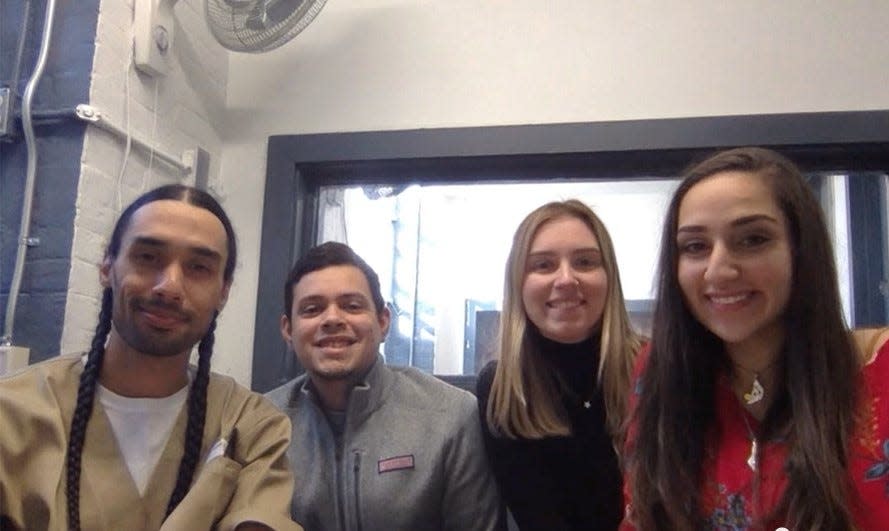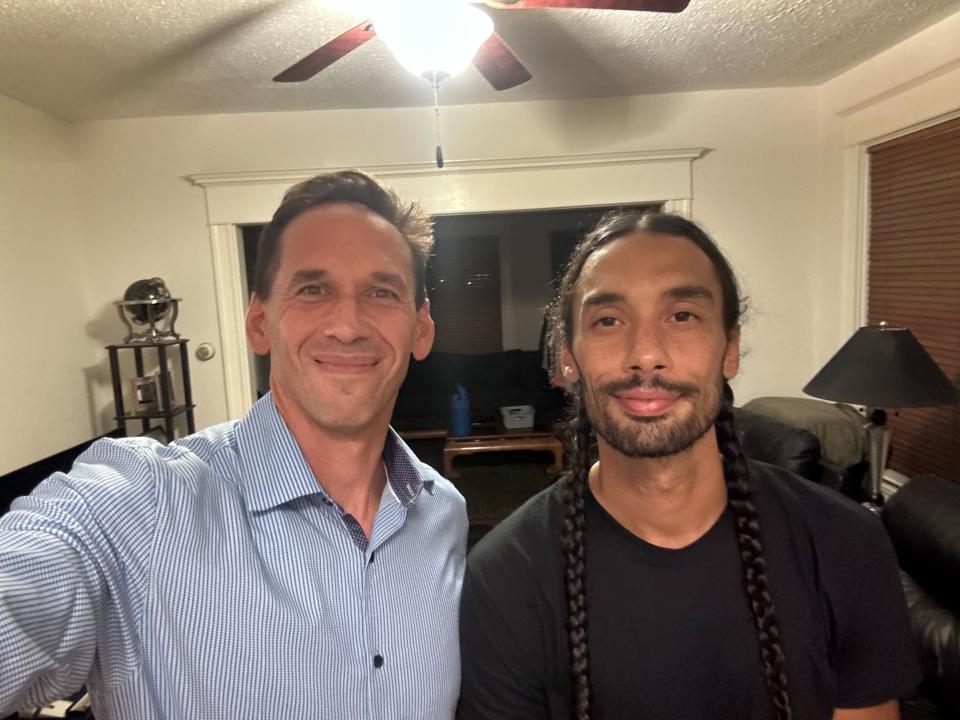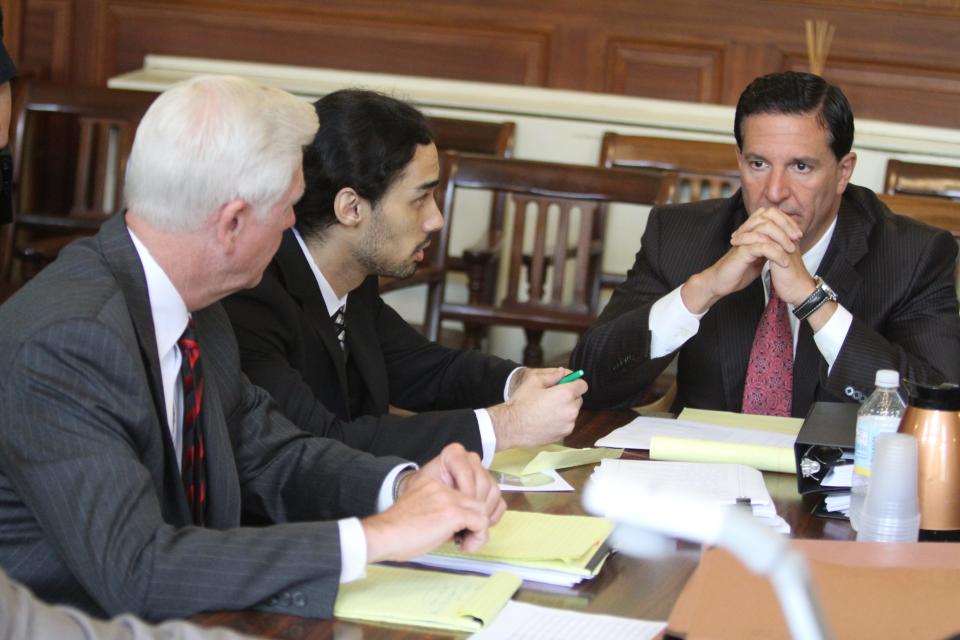Man convicted of RI murder said he was innocent. These college students may help free him.
PROVIDENCE – As soon as Nourjannah Hendi read the facts of Terrel Barros’ case, she became convinced of his innocence.
“It was astonishing when you read the case. There is not a doubt in your mind that he’s innocent,” said Hendi, who was a senior at Georgetown University in the spring semester of 2020.
She and two other undergraduate students who were enrolled in the school’s Making An Exoneree program soon began reinvestigating Barros’ conviction for the shooting death of Jamal Cruz and the wounding of Rokiem Henley outside Monet Lounge in Providence early on Aug. 26, 2012.
They inspected the case file and trial briefings; spoke with Barros’ post-conviction lawyer, Robert Kando; and studiously began filling in what they viewed as gaps in the case. They hired experts in DNA and gunshot residue and interviewed Barros’ friends and family, as well as a juror.
They put their findings together in a nine-minute documentary highlighting what they believe are injustices and inconsistencies in a case that they insist points to another killer: Stephen Bodden, who accompanied Barros to the club that night and was found with the gun in his hand. Bodden told officers at the scene, “Yo. It’s me. It’s all me. It’s all mine.”
Last month, those revelations proved crucial in Superior Court Judge Luis Matos’ ruling overturning Barros’ conviction.

Misleading evidence, new statement
Matos found that the prosecutors in the case – Stacey Veroni Erickson and Peter Roklan – elicited testimony that misled jurors about DNA evidence that excluded Barros from handling the weapon.
Matos ruled, too, that a statement by Bodden’s close cousin, Gloria Parajon, could be admitted as new evidence. According to Parajon, Bodden immediately confessed to her upon his release from the Adult Correctional Institutions. She didn’t disclose his admissions until after seeing the documentary, years after Bodden was murdered in 2017.
“Unencumbered by the threat of Bodden’s presumed retaliation, his associates and family now freely profess his guilt,” Matos wrote.
Noting that both Parajon’s statement and the DNA evidence could prove pivotal to jurors’ considerations, Matos agreed to release Barros on home confinement as he awaits a new trial.
Upon learning of Matos’ ruling, Hendi, who was visiting family in Palestine, recalled screaming into the phone to Barros’ mother, Kym Mulroy.
“I said, 'Kym, we did it! Terrel’s coming home!’” Hendi said. “It was a moment of extreme happiness and disbelief at the same time. The fight is not over.”
Barros, 34, who was serving two life terms plus 30 years, is the seventh person to be freed after their case was reexamined by students enrolled in the Making An Exoneree program. He walked out of prison on Aug. 15 after serving 11 years and declaring his innocence the whole way.
Will there be a new trial or an appeal?
Hendi believes that it was Bodden, not Barros, who fired the gun after a night of revelry and a brief beef after someone tapped off a hat. She points to Bodden’s confession at the scene and to others in the years that followed, the gun residue found on his clothing, and evidence from a parking lot attendant about the shooting that she says eliminates Barros as a suspect.
“Given the new information, we highly encourage the prosecution to drop the case,” Hendi said.
“For us it was very clear Stephen Bodden committed the murder,” said Marc Howard, the founding director of the Prisons and Justice Initiative at Georgetown University, who co-teaches Making An Exoneree. “I just hope the state will show some common sense and come to the conclusion that it doesn’t make sense to try him."

Brian Hodge, spokesman for Attorney General Peter F. Neronha’s office, said they are reviewing Matos’ decision and have until Oct. 9 to seek a state Supreme Court review. He declined further comment because the case remains pending.
Seven freed due to Making An Exoneree
Since 2018, Howard has co-taught Making An Exoneree each spring with his childhood friend, Marty Tankleff, who was wrongfully imprisoned for almost 18 years after being falsely implicated in the stabbing deaths of his parents in 1988.
At the time of his arrest, Tankleff was 17 years old and starting his senior year in high school. He was sentenced to 50 years to life but filed an appeal based on new evidence from about two dozen witnesses.
More: Kids as translators? Non-English speakers lack trained interpreters in RI's local courts
Tankleff was released on Dec. 27, 2007, with the charges dismissed a year later. His parents’ murders remain unsolved.
The highly selective seminar class features 15 students working on five potential wrongful conviction cases. They create documentaries and social media campaigns that suggest innocence based on their investigations.
Men and women claiming innocence apply to have the students take up their cases. Each is vetted by Howard, Tankleff and others before being presented to the students.
When the class began, a few dozen cases came in. Today, the Prisons and Justice Initiative team is fielding more than 400, Howard said.
“They just keep coming in,” Howard said.
During the semester, the students transform into investigative journalists, documentarians and social justice activists as they examine cases that have often been overlooked by other innocence organizations. They travel to visit their “clients” as they reinvestigate the crime and conviction and try to unearth new leads and evidence. Their task is to explore the main issues, challenges, injustices and human stories involved, according to the program.
According to the program, the students’ work has contributed to the exonerations and releases of Valentino Dixon, Eric Riddick, Keith Washington and Arlando “Tray” Jones III, who collectively served more than 103 combined years in prison. Princeton University has also launched a Making An Exoneree program and is responsible for one of the six people who have been freed, Howard said.
Barros case wends its way to Georgetown
Howard said Barros’ case was brought to his attention by Analicia Chaves, of New Bedford, a social media influencer who goes by Ana Montana and boasts 3.3 million followers.
Chaves, who did not respond to messages, praised Barros in the documentary as a loyal friend with strong morals and integrity.
The Barros case “rose to the top,” Howard said.
“They found some things that hadn’t been widely known and hadn’t been introduced in court that very strongly suggested innocence,” Howard said.
Drawn to revisit Barros case
Hendi, whose parents are Palestinian, said Barros’ case resonated with her, based on her family’s background.
“It’s very normal for Palestinians to be imprisoned unjustly,” Hendi, 25, said.
Over the last three years, Hendi said she has spoken with Barros and his mother almost daily.
'Dark cloud' over District Court: Ex admin alleges coverups, dysfunction and retaliation
“I really feel like he’s my brother and she’s a second mom to me,” said Hendi, who now lives in Jordan.
She describes Barros as an “incredible” and passionate person of immense conviction.
“The DNA evidence was shocking to me,” Hendi said. “Forget all of that. Stephen confessed at the scene of the crime. Stephen had the gun in his hand.”

Matos faulted the prosecutors for misleading jurors, writing, "it appears that the prosecution specifically elicited the testimony to create a false impression that Barros’s DNA was on the gun.”
Hendi and Howard also disputed a statement by the police that Cruz nodded that Barros was the shooter as he told officers, "I'm fading, I'm fading.”
“That is about the weakest identification I’ve ever heard of,” Howard said.
Hendi created an Instagram page, online petition and fundraiser to support Barros’ reentry with fellow students Caroline Porterfield and Leonardo Teixeira, who joined her in reinvestigating the case.
They look to lyrics written by Bodden in “Letter to Terrel” in which he sings of his remorse that he “Got my [expletive] in a cell.”
“It’s basically an ode to Terrel,” Howard said.
A night of partying turns deadly
Cruz, a 38-year-old Massachusetts father of twin boys, and Rokiem Henley had traveled from Brockton, Massachusetts, hours before the shooting to attend a birthday celebration at the Monet Lounge.
Henley, who was shot in the leg, identified Barros as one of the men with whom Cruz had argued inside the club shortly before closing, with tensions spilling out into the parking lot.
The police testified that Cruz nodded that Barros was the shooter as he was about to die. A lawyer for Barros insisted it was Bodden, Barros' companion, who shot the gun that night. The late Thomas Connors, who with Joseph Voccola represented Barros, told jurors that police found Bodden jamming the gun into the passenger-side door after the shooting and that Bodden's DNA, not Barros', was on the gun.
Barros, who could not be reached for comment, was found guilty on six counts. Superior Court Judge Robert D. Krause sentenced him to two consecutive life sentences plus three consecutive 10-year terms for the shootings of Cruz and Henley. (Matos oversaw Barros' effort to overturn his conviction, because Krause had made a previous adverse ruling involving the case, Kando said.)
Bodden pleaded guilty to charges of carrying a pistol without a license and common law felony. He was sentenced to 10 years at the ACI, with four to serve.
Hendi said she tried to remain upbeat throughout their journey, assuring Barros, “We’ve got this.”
"In the back of my mind, I was afraid that I may have been giving Terrel false hope. Not because of what we were doing but because we were fighting the same system that convicted him in the first place,” Hendi said. “Honestly, the man has had enough.”
This article originally appeared on The Providence Journal: Man has RI murder conviction overturned, thanks to Georgetown students

